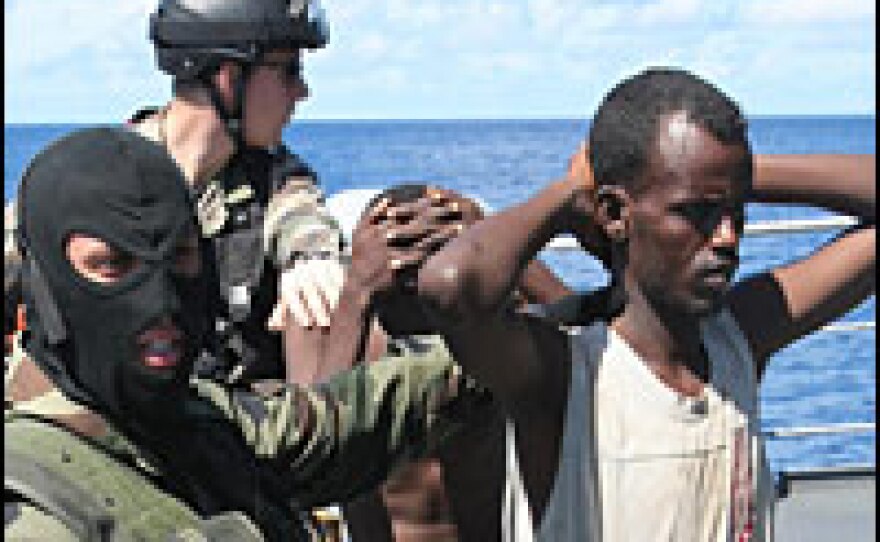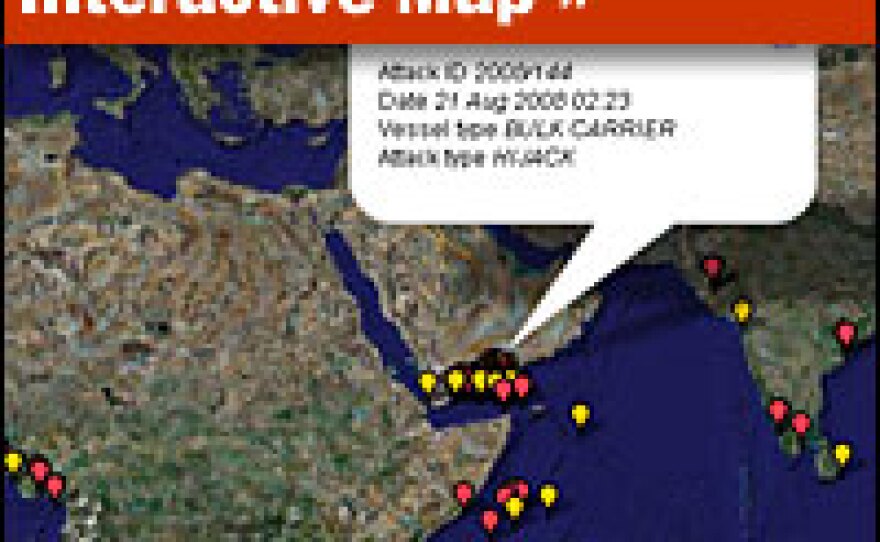
A review of U.S. efforts to combat piracy on the high seas is nearing completion. Military options are under consideration, but experts agree that the ultimate answer to the piracy problem will also require political solutions — addressing issues such as poverty, lawlessness and instability in the pirates' countries of origin.
Just hours after merchant marine Capt. Richard Phillips of the Maersk Alabama was rescued from Somali pirates by the U.S. Navy on April 12, Adm. Mike Mullen, chairman of the Joint Chiefs of Staff, instructed defense planners to come up with some "fresh ideas" for fighting piracy.
In an interview with NPR after he ordered his review, Mullen noted that the scourge of piracy requires more than just a "military solution."
Vast Waters, Few Ships
Mullen's view is common in the hallways of the Pentagon when talk turns to the difficulty of stopping piracy in the busy shipping lanes that stretch from the Gulf of Aden to the coast of Somalia.
Senior military officers say enforcement alone will not solve the problem. The surest way to end piracy is not at sea, but through the creation of a stable government in Somalia, more trained security forces and a stronger economy.
"There are 16 nations with navy ships in the vicinity right now, but it's over a million square miles of water," Mullen told NPR.
"There are an awful lot of ships, and the number of Navy ships that we have out there just can't cover the water, nor would increasing that number dramatically cover the water," he said.
A million square miles of water is roughly four times as large as Texas. And each year up to 25,000 ships — ranging from cargo ships to sailboats — traverse the area.
Compare that with the number of warships patrolling this vast stretch of ocean: between 29 and 35 from the United States and other nations, according to British Royal Navy Commodore Tim Lowe, the top operations officer in the battle against pirates off East Africa.
When asked how many more warships are needed, Lowe says the bottom line would be "as many as we can realistically get into the area to support us." But, he adds, "I doubt very much whether we're ever going to have enough."
One of the U.S. Navy's key missions is to keep the sea lanes open around the world, and anti-piracy patrols are part of that. It's a big job for a Navy that now has fewer than 300 ships.
Boosting Fleets, Surveillance
Pentagon sources tell NPR that one option under Mullen's piracy review is to send more U.S. Navy ships to patrol for pirates off Somalia — but probably not more than a handful. Other countries are being encouraged to send more ships as well.
Increasing the number of warships makes sense to Rick Norton, a retired Navy commander who teaches national security at the U.S. Naval War College.
"You can do a lot with relatively low-end, inexpensive ships, corvettes, frigates, the types of ships that many navies in the world have," Norton says.
These types of ships provide multiple assets in the anti-piracy effort, he says. They have helicopter decks, which increase the capacity for activity and surveillance. They bring modest-caliber guns that are more than adequate to deal with the type of craft that pirates use. The ships also are adequately fast for the task.
Increased surveillance is another option being raised in Mullen's review. According to Norton, that might include more P-3 patrol planes and more drone aircraft that can cover a wide swath of ocean and coastline, sending back live video pictures of possible pirate activity or ships in distress.
Setting Up Security Teams, Convoys
Pentagon sources say other options in Mullen's piracy review include placing U.S. Navy security teams of a half-dozen armed sailors or Marines aboard some commercial ships. The ships could provide security along shipping routes more at risk of piracy.
Convoys are another option, Norton says.
"You could set up a convoy system, you could set up traffic lanes, and you could patrol the traffic lanes and thereby reduce the amount of water you had to cover to prevent pirate attacks," he says.
But convoys only go "so far" because they are voluntary in nature, Norton says.
"Ships would have to agree to be part of a convoy system, and you probably couldn't force them to do that," he says.
Attacking Pirates On Land
Yet another option calls for military attacks against pirate havens in Somalia — the camps where they live and plan their raids.
Attacking the camps might make sense, says retired Vice Adm. Kevin Cosgriff, the top U.S. Navy commander in the region until 2008.
"I'm being very specific in suggesting the camps, which tend to be discreet locales along the beach in Somalia," Cosgriff told the Middle East Institute in Washington, D.C., in April.
"Denying the means of piracy obviously would have an effect. For clarity, this would [mean] staying out of the villages, staying away from populated areas. The raid is aimed at equipment, not people" — equipment such as boats and supplies, Cosgriff says.
A more risky proposal, he says, is for larger military operations, or what he calls "going ashore big."
That would involve broader, sustained operations to literally put the pirates out of business by seizing pirates and property, and targeting Somali clan leaders and others who profit from piracy, Cosgriff says.
But Cosgriff says he doesn't "see much of an appetite for this just yet" because of the high risks associated with such an operation.
Pentagon sources say Mullen's review is looking at military strikes ashore, but that option is highly unlikely considering the risk to civilians.
Ultimately, Political Solution Needed
The current wave of piracy off the coast of Somalia got its start with out-of-work fishermen about eight years ago, says Lowe, of the British Royal Navy.
"The ultimate solution for piracy is on land," says Vice Adm. William Gortney, the top U.S. naval officer in the region.
"Piracy around the world stems from activity where you have lawlessness, lack of governance, economic instability," Gortney said to reporters just after the rescue of Phillips, the Maersk Alabama captain.
"And wherever you have that, you're going to have criminal activity at sea," he said.
That's why Mullen's piracy review will also send this message: Piracy can't be solved just by sending in more warships.
Copyright 2022 NPR. To see more, visit https://www.npr.org. 9(MDAzMjM2NDYzMDEyMzc1Njk5NjAxNzY3OQ001))







